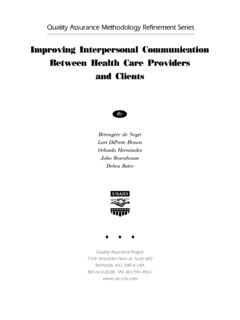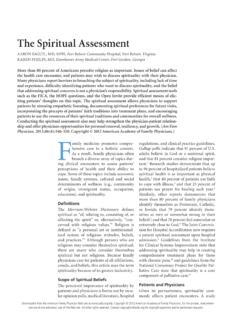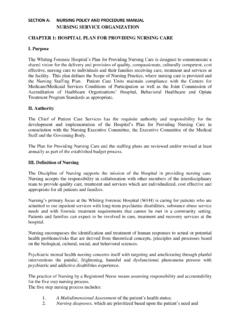Transcription of Encouraging Quality in Early Childhood Education and Care ...
1 1 Encouraging Quality in Early Childhood Education and care (ECEC) RESEARCH BRIEF: QUALIFICATIONS, Education AND PROFESSIONAL DEVELOPMENT MATTER What are qualifications, Education and professional development in ECEC? ECEC qualifications indicate the recognised level and types of knowledge, skills and competencies that ECEC staff have Formal Education in ECEC refers to the level and type of Education that ECEC staff pursue to acquire such knowledge, skills and competencies to work in the sector. Professional development provides opportunities for staff who are already working in the sector to update or enhance their practices; it is often referred to as in-service training , continuous Education or professional training . What is at stake? Recent social changes have challenged traditional views of Childhood and child rearing: 1) the changing socio-economic role of women, 2) growing ethnic diversity of developed countries, and 3) changing views on ( Early ) Education and the purpose of ( Early ) Education .
2 The last two changes have important consequences for what is expected of those who work with young children. As pointed out by the OECD teachers review (OECD, 2005), Education systems need to invest in intensive teacher Education and training if teachers are to deliver high- Quality outcomes. This also refers to the ECEC sector (OECD, 2006). Specific knowledge, skills and competencies are expected of ECEC practitioners. There is a general consensus, supported by research, that well-educated, well-trained professionals are the key factor in providing high- Quality ECEC with the most favourable cognitive and social outcomes for children. Research shows that the behaviour of those who work in ECEC matters and that this is related to their Education and training. The qualifications, Education and training of ECEC staff are, therefore, an important policy issue (OECD, 2006). In spite of the consensus on the importance of well-trained staff, governments often fear the funding consequences of raising staff qualifications.
3 Higher qualifications can be followed by increased wage demands, which, in turn, contribute significantly to the costs of services. Although the evidence is strong that improved training and qualification levels raise the Quality of interaction and pedagogy in ECEC services and similar evidence exists in favour of staff qualifications governments often choose not to invest in raising qualifications or funding staff training (OECD, 2006). This might seriously affect ECEC Quality , and with this, child development outcomes, since staff are not being optimally trained or educated to stimulate Early learning and development. Although research emphasises the high relevance of adequate staff initial Education and continuous professional development opportunities, large differences occur between countries in 1 In the literature, staff is the term that is usually used to refer to those who work directly with children in the ECEC field.
4 They are also referred to as professionals , teachers , caregivers or practitioners . 2 terms of which qualifications are being asked of ECEC practitioners. Opportunities to participate in professional development and in-service training also vary greatly across countries and between Education and child care in split systems. The qualification requirements vary from no formal Education at all to a specialised bachelor s or even master s degree, and professional development and training ranges from being compulsory to being based on voluntary will in combination with no additional funding for training (OECD, 2006). Often there is a difference between the qualifications required to work with very young children (up to three or four years of age) and the qualifications needed to be a teacher for children age four to primary school age. This is especially the case in countries with a so-called split system: children ages zero to three or four attend different ECEC institutions (often day care services) than those ages three or four to primary schooling age, who more regularly attend pre-primary services.
5 In countries with an integrated system where all young children (age zero to primary school age) attend the same centres, all practitioners usually have to meet the same requirements in terms of Education and training (Eurydice, 2009; OECD, 2006). The latter encourages continuous child development throughout the ECEC years and ensures greater professionalism of staff working with both younger and older children (Shonkoff and Philips, 2000). Why do qualifications, Education and professional development matter? Staff qualifications/ Education /professional development pedagogical Quality child outcomes The main importance of staff lies in their effect on the process and content Quality of ECEC2 (Sheridan, 2009; Pramling and Pramling Samuelsson, in press 2011). The training and Education of ECEC staff affects the Quality of services and outcomes primarily through the knowledge, skills and competencies that are transmitted and encouraged by practitioners.
6 It is also considered important that staff believe in their ability to organise and execute the courses of action necessary to bring about desired results (Fives, 2003). Qualifications can matter in terms of which skill sets and what knowledge are recognised as important for working with young children. The skills and staff traits that research identifies as important in facilitating high- Quality services and outcomes are: Good understanding of child development and learning; Ability to develop children s perspectives; Ability to praise, comfort , question and be responsive to children; Leadership skills, problem solving and development of targeted lesson plans; and Good vocabulary and ability to elicit children s ideas. However, it is not the qualification per se that has an impact on child outcomes but the ability of better qualified staff members to create a high- Quality pedagogic environment that makes the difference (Elliott, 2006; Sheridan et al.)
7 , 2009).There is strong evidence that enriched stimulating environments and high- Quality pedagogy are fostered by better qualified staff; and better Quality pedagogy leads to better learning outcomes (Litjens and Taguma, 2010). Key elements of high 2 Process Quality refers to what children actually experience in their programmes: that which happens within a setting. Content Quality specifically refers to the substance of what is being learned ( , curriculum). 3 staff Quality are the way staff involve children and stimulate interaction with and between children as well as staff s scaffolding strategies, such as guiding, modelling and questioning. More specialised staff Education and training on ECEC are strongly associated with stable, sensitive and stimulating interactions (Shonkoff and Philips, 2000). Other elements of high staff Quality include staff s content (curriculum) knowledge and their ability to create a multi-disciplinary learning environment (Pramling and Pramling Samuelsson, in press 2011).
8 What matters most? Level of Education and/or pedagogical practices Studies that have addressed the question of whether higher staff qualifications lead to better pedagogical practice have yielded mixed results. There are various studies showing that, generally, a higher level of Education is associated with higher pedagogic Quality in ECEC settings. One study found that preschool teachers with bachelor s degrees were the most effective practitioners. Their effectiveness was measured within the classroom and based on stimulation, responsiveness and engagement of the children in learning activities (Howes et al., 2003). The results of the Effective Provision of Pre-school Education (EPPE) study from England (United Kingdom) have also shown that key explanatory factors for high- Quality ECEC were related to staff with higher qualifications, staff with leadership skills and long-serving staff; trained staff working alongside and supporting less qualified staff; staff with a good understanding of child development and learning (Siraj-Blatchford, 2010).
9 Higher proportions of staff with low-level qualifications were related with less favourable child outcomes in the socio-emotional domain (social relationships with their peers and co-operation). However, the general conclusion that higher Education of ECEC staff leads to higher pedagogical Quality and, therefore, to better child outcomes is not supported by all studies. Early et al. (2007) emphasise that teacher Quality is a very complex issue. There is no simple relationship between the level of Education of staff and classroom Quality or learning outcomes. They studied the relationship between child outcomes and staff qualifications and found no, or contradictory, associations between the two. They argue that increasing staff Education will not suffice for improving classroom Quality or maximising children s academic gains. Instead, raising the effectiveness of Early Childhood Education will likely require a broad range of professional development activities and support for staff s interactions with children.
10 An area that can improve pedagogical practices of ECEC staff includes supporting staff s competence to communicate and interact with children in a shared and sustainable manner (Sheridan et al., 2009). Research also points out that it is not necessary that all staff have high general levels of Education . Highly qualified staff can have a positive influence on those who work with them and who do not have the same high qualifications. The EPPE study finds that the observed behaviour of lower-qualified staff turned out to be positively influenced by working alongside highly trained staff (Sammons, 2010). Specialised Education and training Not only the level of Education but also the content of the staff s educational or training curriculum is important for the level of Quality in ECEC. Specialised Education is associated with better child outcomes and improved staff competences to provide suitable pedagogical learning opportunities.


















